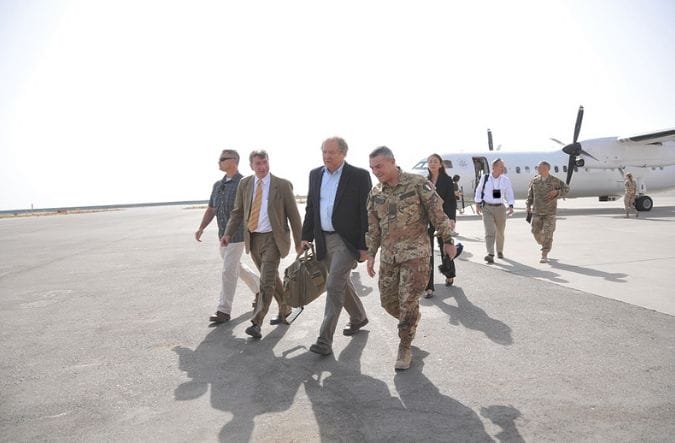Refugees continue to flee Afghanistan more than 17 years after the U.S. began pouring billions of U.S. taxpayer money into the Muslim country to help.
Where has all the money gone? We asked the man tracking it on behalf of all of us: John Sopko, the Special Inspector General for Afghanistan Reconstruction.
The following is from the latest episode of Full Measure with Sharyl Attkisson. Watch the video by clicking here.
We begin with Afghanistan: our longest war in U.S. history. President Trump recently ordered thousands of US troops to be pulled back from Afghanistan and said he’s thinking about withdrawing entirely. The Afghan War has claimed the lives of thousands of US soldiers and wasted billions of our tax dollars. Our newest assessment comes from John Sopko, the Special Inspector General for Afghanistan Reconstruction.
When U.S. Inspector General John Sopko is on site in Afghanistan it’s not for sightseeing.
Sopko: But the contract said this should be tile and the walls should be tile and there should be working stoves. Were there any working stoves?
Afghan official: Ever since we inspected, we never found one.
On this day, he’s inspecting yet another building our tax dollars paid for.
Sopko: Was this supposed to be air conditioned?
Afghan official: Yes, sir.
…And wondering where all the money went.
Sopko: See Lieutenant, when we built this building there was supposed to be tile up the walls, there was supposed to be working stoves.
17 years long into America’s War in Afghanistan— one thing is clear: there’s more frustration than progress.
Sopko: But we paid for tile for your government and you didn’t get it. It was not installed, okay.
Sharyl: In the Afghanistan conflict going on now, why is it we’re there and what is it we’re trying to do?
Sopko: It goes back to the attack of 9/11. And we went in there because of the fact that was a training ground for terrorists who attacked us and later attacked our allies. So we went in to help the Afghans kick the terrorists out as well as developing government that could keep them out. And that’s why we’ve been there for 17 years.
In 2017, President Trump approved the Pentagon’s request to add thousands of soldiers to the 11,000 troops already in Afghanistan. US commanders were given more leeway to strike the Taliban, al-Qaeda and ISIS terrorists. Last July, Secretary of State Mike Pompeo said the changes seemed to be effective.
Pompeo: My conclusion from this visit is that the president’s strategy is indeed working. Taliban momentum is slowing.
But four months later, America’s top general— Joseph Dunford—admitted the Taliban are “not losing.” In all, more than 2,400 US soldiers have been killed. The Islamic extremist Taliban remain dominant and spreading. The Afghan government is mired in corruption. And billions of US tax dollars has been lost to waste, fraud and abuse.
Sharyl: How much US tax money has been spent on Afghanistan reconstruction?
Sopko: Reconstruction alone is $132 billion dollars.
Sharyl: You said in a report to Congress that billions of dollars in western foreign aid to Afghanistan has been lost due to widespread waste, lax oversight and endemic corruption. That sounds bad.
Sopko: That’s correct. We have wasted billions of dollars. And not just us, but also our coalition partners have wasted billions, too.
Sharyl: You found that money is being allocated for equipment and salaries for people in Afghanistan who don’t actually exist, so someone must be taking it?
Sopko: Absolutely. What happens is the commanders or some corrupt official will take the money and it’s supposed to be going to a police officer who doesn’t exist and this is an endemic problem throughout Afghanistan.
Sharyl: Are there any new examples of projects that you’re taking a look at that you feel are perhaps ripe for waste, fraud or abuse?
Sopko: A senior military officer for the US government warned me that NATO is now planning to build a six story, 120,000 square foot headquarters for the NATO military there. Now just stop for a second. That sounds good on its face, but we haven’t had a new headquarters there for 17 years. We had 140,000 NATO troops there over 17 years. But now when our troop population has gone down, we’re thinking about trying to eventually get out— Why do you need a new headquarters? And this goes back to things we have identified before, that the way the government works— and it’s not just the US government, it’s also NATO— once the process starts, once military construction starts, it doesn’t stop even if you don’t need it. So we’re going to be looking into that.
Sopko’s job as inspector general is made all the more difficult because it’s so dangerous in Afghanistan. He and his team can’t move around freely to inspect all the projects they need to. Last November, more than 50 people were killed when a suicide bomber attacked a wedding party in the Afghan capital, Kabul.
Sharyl: What did you see on your last trip? What will we see in those photographs and images?
Sopko: We went out to a major construction project that we did for the Afghan military. It’s called the General Fahim a training center. It’s for the senior officers and technical officers of the Afghan military. And what you will see is a major problem we have. We build buildings but the Afghans can’t maintain them. We don’t consider the training for the Afghans. A wastewater treatment plant that is no longer functioning, raw sewage is flowing into streams and it’s all because the Afghans don’t know how to fix it. You will see a second wastewater treatment plant we built. Brand new, never been turned on because no one taught the Afghans how to turn it on. You will see a water treatment plant that hasn’t been functioning for years because the Afghans are incapable of designing or working with the system we gave them to input the chlorine. So none of the waters being cleaned.
Sopko: It hasn’t been working since when?
Afghan official: 15.
Sopko: So for three years it hasn’t been working, but we built it, contracted it to have a working, chlorinating system.
Sopko: So these are millions of dollars of, of uh, programs and millions of dollars of construction that are not being used. So what you’re seeing is a constant problem. We give them buildings, we give them programs, we give them equipment, but we don’t plan for sustaining it, how they can sustain it either through training, money, or the will to sustain these programs. So there’s a lot of waste.
One final point of failure has to do with opium trade. Afghanistan is the world’s leading producer of illegal opium, and is still churning out record amounts despite the US presence.
Sharyl: You reported that since 2002, the US government has spent more than $8.8 billion dollars on counter narcotics efforts in Afghanistan. Despite this, Afghanistan’s opium trade is as robust as ever.
Sopko: That’s correct. And I think it’s approximately 30 to 40 percent of their GDP is now narcotics related.
Sharyl: How can that be?
Sopko: Poorly designed programs, unwilling partnership by the Afghans. We don’t have a strategy. To this day, we still don’t have a strategy. And what we reported in our last quarter of the report is the way we see it, no efforts being made on counter narcotics anymore.
Sharyl: Do you ever feel like you’re banging your head up against a wall?
Sopko: Almost every day. You should probably ask my wife about that. I come home a lot frustrated, but it’s not an easy job; if you want an easy job, don’t become an inspector general and uh, and if you want a lot of friends, don’t become an inspector general, but that’s the job I was assigned to. That’s the job. Everybody who’s working for me and it’s a tremendous group. I got 200 people, investigators, police officers, uh, engineers, auditor’s analysts, they’re all doing a tremendous job. It’s the best group I’ve ever worked with in the government, but we do get frustrated. People forget there’s a war going on. Americans are dying, um, money’s being wasted. And people also forget that fraud kills and we’ve documented that. So fraud and corruption will kill Americans. It’ll kill allies and kill Afghans. And that’s why we’re doing the job. And that’s a little bit of the frustration as you don’t have people focusing on is anymore. That’s why we appreciate coming over here talking to you. There are very few reporters in this town who are spending as much time as you do on Afghanistan, which I think is so critical as we go forward.
In another development, President Trump said it’s quote “insane” that Sopko’s reports are made public, because it allows the enemy to see them. But watchdogs say making the reports public helps prevent the Pentagon and defense contractors from hiding waste, fraud and abuse.
Click the link below to watch the video investigation on Full Measure:
https://fullmeasure.news/news/cover-story/exiting-afghanistan

Visit The Sharyl Attkisson Store today
Unique gifts for independent thinkers
Proceeds benefit independent journalism




Sheryl you are a brave and amazing woman !
The strategy is simple. Eradicate, burn or destroy the opium and shoot anyone who shoots at you during the process. Repeat. Repeat. Forget trying to impose any values on a society that refuses to understand the value of clean water, until the opium is destroyed. Draw a line in the sand and invite newcomers who want to learn the value of clean water to cross it, and kill anyone who interferes with anyone wanting to cross the line.
We met young man working at McDonald’s. He told us he’ll be going to Afghanistan in 4 months. We assume he just joined up. He looked like he just graduated from high school. We’re sending fodder to monitor a corrupt government who’s income comes from corruption, US taxpayers, providing drugs to the world. Get our troops out of there. This young man is the future of the US. Afghanistan doesn’t deserve him to be used for their protection. I pray for him every day.